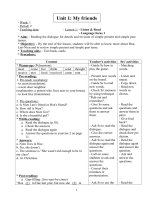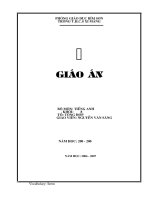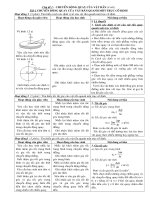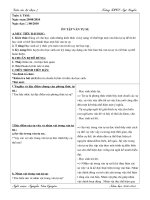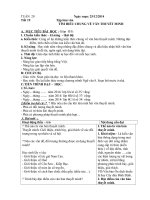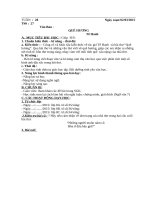GIAO AN ANH 6,7,8,9 vµ tu chon
Bạn đang xem bản rút gọn của tài liệu. Xem và tải ngay bản đầy đủ của tài liệu tại đây (527.97 KB, 68 trang )
August 20
th
, 2008.
The first week.
Period: 1
Review English 6
A, Objectives:
By the end of the lesson, students will be able to review some knowledge in
English 6.
B, Teaching aids :
Textbook 6, Exercises, extra board
C, Procedures :
Time Teacher’s activities Students’ activities
5'
20'
I. Warm up :
* Questions and answers
How are you today?
Are you happy to come back to school?
What’s the weather like today?
Who is on duty today?
II. Review:
1, To Be in the present simple tense:
? How can To Be be divided in the Present
simple tense?
? Can you give some examples?
? Can you change them into the negative
form?
? Interogative?
2, The present simple tense with ordinary
verbs:
? Which are ordinary verbs?
? The present simple form?
Give examples?
Answer the questions
I am
He
She is
It
We
You are
They
Eg: I am a student.
They are students.
I am not a student.
They are not students.
Are you a student?
Are they students?
Eg: like, work, do, travel….
+ S + V(s/es)………….
- S + don’t/ doesn’t +
V_inf
? Do/ Does + S + V_inf…?
Eg: I like English very much.
He likes English very
much.
I don’t like English.
He doesn’t like English.
Am; Is; Are
10'
8'
2'
3, The present progressive tense:
? The formation?
Example?
? The use?
III. Practice:
* Mapped dialogue
Hello, how……….?
Fine,……
What…………doing?
How often…………
………Music?
………fine,
thanks.
And…….?
I………
studying Music.
Twice a week.
IV. Production: (Extra board)
Put the verb in the bracket in the correct
tense: *Present simple or Present
progressive
a- She……… at the moment.( read)
b- I…… television every night.( not watch)
c-I……… television at the moment.(not
watch)
d- We…… our parents every week.(see)
e- The children always… to bed at nine
o’clock.( go)
f- Peter…….to Susan now.( talk)
g- I …….the office every day at five.( leave)
h- At present Tom…… for a friend.( wait)
V. Homework:
- Study English 6 again.
Do you like English?
Does he like English?
Am/Is/Are + V-ing
Eg: I am reading a book now.
She is listening to music at
the moment.
Use: It is used to expressed an
action happening at the
moment of speaking./ in the
near future.
Eg: Where are you going this
summer vacation?
- I’m going to visit Hue.
- Pair work
- Individual work
a- is reading
b- don’t watch
c- am not watching
d- see
e- go
f- is talking
g- leave
h- is waiting
- Take notes.
Good bye!
- Prepare for: Review (con’t)
Good bye!
August 22
nd
, 2008
August 24
th
, 2008.
The second week.
Period: 2
Review English 6 ( Continued)
A, Objectives:
By the end of the lesson, students will be able to review some knowledge in
English 6.
B, Teaching aids:
Textbook 6, Exercises, extra board
C, Procedures:
Time Teacher’s activities Students’ activities
5'
20'
I – Warm up : Jumbled words
oth
lbeuaitfu
rsoht
allsm
synio
II Review:–
1 Comparison–
1.1- Comparative of short
adjectives
? Formation
? Example
* Word cue drill:
Hanoi/ big/ Hai Duong
Mexico City/ big/ Tokyo City
Today/ hot/ yesterday
Mai/ smal/ her sister
1.2- Comparative of long adjectives
? Formation;
Example?
List some irregular comparatives?
1.3- Supelative of short adjectives
Formation?
Example?
1.4- Superlative of long adjectives
Formation?
Example?
List some irregular superlatives?
2 – There is / There are
Hot
Beautiful
Short
Small
noisy
S
1
+ be + short adj ER + than + S
2
Nam is shorter than Ba.
Individual work
S
1
+ be + more + long adj. + than +
S
2
Mai is more beautiful than her aunt.
Noisy-> noisier Bad-> worse
Happy-> happier Many/much-> more
Narrow-> narrower Little -> less
Clever-> cleverer
Good-> better Far -> farther/further
S + be + the + short adj EST
Eg: She is the tallest girl in my class.
Mexico is the biggest city in the world.
S + be + the most + long adj.
Eg: She is the most intelligent student.
It is the most interesting story.
Good/ well-> the best
Bad/ ill -> the worst
Little -> the least
Many/much-> the most
Far -> the farthest/ furthest
7'
11'
2'
How to use?
Note: There is usually an adverb of
place in the structure “ There is/are”
Example?
I II – Practice:
Rewrite the following sentences so
that it has the same meaning to the
first.
a- Our classroom has three windows.
b- My family has five people.
c- Her garden has a big tree.
IV Production:–
Ask students to discribe their
classroom, their school,…. using the
structure “ There is/ are”
IV Homework:–
- Study English 6 again.
- Prepare for: Unit One
Good bye!
There is + singular countable noun
uncountable noun
There are + plural countable noun
There is a book on the table.
There are 4 people in my family.
-> There………………………………
-> There………
-> There…………
Discribe the real objects.
- Take notes.
Good bye!
August 25
th
, 2008
September 7
th
, 2008.
The third week.
Period: 3
Topic I: Personal information
Lesson 1: Back to school.
A – Objective:
By the end of the lesson, students will be able to know how to use: “ Too, So” in
positive statements.
B – Teaching aids:
Text book, reference book, extra board, word cues.
C - Procedures:
Time
Teacher’s activities Students’ activities
5'
15'
12'
10'
3'
I – Warm up : Matching
Pretty good. B×nh thêng th«i
How is everything? Kh¸ tèt
Nice to see you. Mäi viÖc nh
thÕ nµo?
So am I./ I am, too. RÊt vui khi
gÆp b¹n
Just fine. T«i còng vËy
II Review: –
The use of Too, So with the verb :
“To Be” and “Ordinary verb”
When do we use TOO, SO?
The form with TO BE?
The form with ordinary verbs?
III Practice:–
Word Cues:
I/ happy. So/ he
Nice/ meet/ you. Nice/ too
I/ want/ go/ home now. So/ I.
Phong/ from Hue. Lan/ too.
Questions and answers
What do you say when you meet
someone and what do they respond it?
- Ask Ss to work in pairs to practise
greeting each other.
IV Production:– Sentence Completion
- Asks Ss to play in roles of John or Mary,
complete the following sentences.( Extra
Board)
JOHN
1 – I’ m happy.
2 - Jane’s mother is a teacher.
3 – I go to school by bike.
4 – I’ m tired.
5 – My sister was late for class.
6 - I can ride a bike.
Ask Ss to work in pairs
Call on some pairs of students to practise
- Do Matching
When we want to express the
agreement with a positive idea.
So + Be + Subject.
Subject + Be, too.
So + Aux.Verb + Subject.
Subject + Aux.Verb, too.
- Individual work
- Pair work
Ss: Nice to meet you.
-> Nice to meet you, too.
-> Me, too.
Ss: I’m glad to see you.
-> So am I./ I am, too.
- Pair work.
MARY
- I’ m happy,……….
- Her father is a teacher,………
- So ……… I.
- I am, ………
…… was my sister.
- I ………, too.
- Open - pair
- Closed pair
aloud before class.
V Homework:–
- Prepare for the next lesson: con-
solidation.
Good bye!
- Take notes.
Good bye!
September 8
th
, 2008.
September 14
th
, 2008.
The fourth week.
Period: 4
Topic I: Personal information
Lesson 2: Back to school.
A – Objective:
By the end of the lesson, students will be able to practise further in the Present
Progressive Tense.
B Teaching aids:–
Reference book, extra board
C - Procedures:
Tim
e
Tseacher s activities’ Students activities’
7' I Warm up:– Noughts and crosses
you/ swim he/ play soccer they/ run
Lan/ study your mother/ Mr. Hai/
travel
Music cook dinner to work
- Group work
S1: What are you doing?
S2: I am swimming.
12'
13'
10'
3'
She/ have Ba/ write a your dog/
bark
Breakfast letter
II Presentation:–
Activity 1:
Review: the Present progressive
Sets the scene: “Look at the picture in
part 4 Unit 1 page 17. What are the– –
girls doing?”
What is the tense? form?
Use?
Meaning?
Can you give the positive, negative and
interogative forms?
Adverbs?
Activitiy 2
III - Practice:
Exercise 1. Choose the correct tense of
the verbs in the brackets: Present
simple or Present progressive.
1- Lan (not have) .many friends…………
in her new school.
2- Hung (come) from Vinh but…………
he
(stay) with relatives in Ho Chi………
Minh at the moment.
3- We (not drive) .to work every………
day. We (go) . by bus.………
4- Who you (talk) .on the phone………
now, Minh?
5- Where your friend (live) , Nga?………
-> She (live) on Tran Phu…………
street.
- Calls on some students to say their
sentences aloud and correct if neccessary
IV Production:–
Change game
Teacher: I am playing soccer.
V- Homework:
Ss: They are riding their bikes.
The Present Progressive Tense
Am/ Is/ Are + V
-
ing
It is used to express an action
happening at the moment of speaking.
“….®ang .”…
S + am/is/are + V
-
ing
S + am/is/are + not + V
-
ing
( Wh- word) Am/Is/Are + S + V
-
ing ?
Now, at the moment, at present,
today, …
- Individual work
- Answer Key:
doesn t have’
comes
is staying
don t drive’
go
are you talking
does your friend live
lives
Say aloud.
- Play the game
S1: I am playing soccer and playing
volleyball.
S2: .………………………
- Study the Present Progressive tense.
- Prepare for new lesson: Unit 1 -
(Consolidation).
Good bye!
- Take notes.
Good bye!
September 15
th
, 2008.
September 21
st
, 2008.
The fifth week.
Period: 5
Topic I: Personal information
Lesson 3: Telephone numbers
A – Objective:
By the end of the lesson, students will be able to practise further some model
sentences used in telephone calling.
B Teaching aids:–
Reference book, extra board
C Procedures:–
Time Teacher s activities’ Students activities’
5
13
I Warm up:– Matching
Match the phone numbers with the way to read
them
8 356 190
8 269 561
8 311 672
8 208 014
8 237 041
8 250 514
8 568 917
II Presentation:– Mapped dialogue
Set the scene: “Tomorrow Phong has a day off. He
wants to invite Mai to play tennis”. Complete their
phone call.
eight three double one, six
seven two
eight two three seven, oh
four one
eight two five oh, five one
four
eight three five six, one
nine oh
eight two six nine, five six
one
eight five six eight, nine
one seven
eight two oh eight, oh one
four
13
13
Hello, This is 8 942
810
Yes…… is this?
Yes, I will.
Sure.… will we play?
… will we meet?
Ok. I’ll… you
tomorrow.
Hello. ………that
Mai?
It’s me, Phong. ……
you be free tomorrow
afternoon?
… you like to play
tennis?
We’ll play at Lan Anh
court.
We’ll meet…… three
o’clock.
Ask Ss to practise the dialogue in pairs
Review some models used in phone call.
• This is + phone numbers
• Is this ?…
• Can I speak to A, please?
• Sorry. S/He’s out.
• Who is calling please?
• It’s Nga/ Nga speaking.
• I’ll call again./ I’ll call back later.
III Practice:– Ordering
Rearrange the following sentences to make
meaningful dialogue
… This is Nga. When will she come back?
… Hello. Can I soeak to Trang, please?
……Hello. This is 8 630 842.
……She’ll be back at about 4.30.
……I’m sorry. She’s out at the moment. Who’s
calling?
……All right. Please tell her I’ll call again at five.
……Thank you. Good bye.
…….OK. I’ll tell her.
……Bye.
Get feedback
Ask Ss to work in pairs to practise the dialogue
IV Production: –
Correcting mistakes ( Extra board)
Each sentence has a mistakes. Find and correct it.
1 – I phone you tomorrow morning, okay.
2 - My friend best is Nga.
3 – I’ll phone my sister every day.
4 – I don’t want to drive.
- Ok, I drive.
Complete the dialogue
Pair work
Review and practice
Rearrange the dialogue.
Give feedback
Pair work
Correct the mistakes
individually
1'
5 – She lives on 35 Phan Boi Chau street.
6 – When will she is back?
7 – I see you tomorrow.
8 – The party be at Tuan’s house next Sunday.
9 – Do you want see a movie?
10 – Can I speak about Nga, please?
V Homework:–
- Prepare for the future simple tense.
Good bye!
- Take notes.
Good bye!
September 22
nd
, 2008
September 28
th
, 2008.
The sixth week.
Period: 6
Topic I: Personal information
Lesson 4: The simple future tense
A – Objective:
By the end of the lesson, students will be able to practise further in the Simple
Future Tense.
B Teaching aids:–
Reference book, extra board
C Procedure–
Time
Teacher s activities’ Students activities’
5’
13’
I Warm up: – Noughts and crosses
I/ go/ the We/ travel/ Nha Nga and Lan/
Supermarket/ Trang/ next week visit/ their
grand
tomorrow parents/
They/go/the Hoa/ have/ lots I/ come/ after
movies/ of friends/soon lunch
tonight
He/see/you/ My father/ be free/ The
students/go/
tomorrow at 7.30 this camping/
next
evening Sunday
II Presentation: – Review the Simple Future
tense
* Affirmative form
S + will + V_bare infinitive
* Negative form
S + won’t + V_bare infinitive
* Interogative form
Group work
Review and practice
16’
10’
1’
. (Wh- qs word)+ will + S + V_bare infinitive?
* Use: express an action which will happen in
the future; or a plan for the future
* Adverbs of time used in the tense:
tomorrow, tomorrow
morning/afternoon/evening, next
week/month/year/Monday ,tonight,… …
* Examples: Ask SS to give as many examples
as possible
- Note: We can use: Shall instead of Will with
I or We
I shall = I will
We shall = We will
III Practice: – Writing ( Poster)
“Next week your class will go on
vacation to Ha Long Beach/ Ha Noi Capital/
Hue . You write about who you will meet,…
what you will do, things you will buy, what
time you will leave ”……
Divide the class into four groups to write in
10 ms
Ask Ss to exhibit their writing, comment and
correct if necessary.
IV Production: –
Making sentences ( Etra board)
Change the following sentences into the
negative and interogative forms.
1 – I phone you tomorrow morning.
2 – He will call again at five o’clock.
3 – My mother will go to the supermarket next
Sunday.
4 – They will meet in front of the theater.
5 – We will come there on time.
6 – He will see her tonight.
V Homework–
Prepare for the ordinal numbers, inviting card
Give examples:
- Today she is in London.
Tomorrow she’ll be in Rome.
Next week she’ll be in Tokyo.
- Will you be at home this
evening?
- I will go to Hanoi tomorrow.
Imagine you will go on
vacation to Ha Long. Write a
short paragraph about the trip.
Group work
Correct the mistakes
Eg: I won’t phone you
tomorrow.
Will you phone me
tomorrow?
Good bye
September 28
th
, 2008.
October 5
th
, 2008.
The seventh week.
Period: 7
Topic I: Personal information
Lesson 5: Writing
A – Objectives:
By the end of the lesson, students will be able to practise further in the way to say
and write the date, the way to write an invitation card.
B Teaching aids:–
Reference book, extra board
C Procedures–
Time Teacher s activities’ Students activities’
5’
13’
16’
I Warm up: – Questions and answers
- What’s your name?
- What is your address?
- What is your telephone number?
- Who do you live with?
- How far is it from your house to
school?
- How do you go to school?
- What’s your date of birth?
- How old will you be on your next
birthday?
II Pre writing: – – Complete the table
Ask Ss to fill in the table then practise
saying them aloud
We write We say
May 25 The twenty-fifth of May
April 1
The sixth of june
July 18
The tenth of August
September 2
The twentieth of October
November
23
The twenty-eightth of
February
January 31
III While writing– –
You will have a party for your birthday and
Answer the questions
Fill in the table, then practise
saying aloud
Write the invitation card
individually
* Suggested writing
Dear Ngoc,
10’
1’
you want to invite some of your friends to
your party. Write an invitation card basing on
the information:
Your name
Your friend s name’
Date of the birthday party
Place of the party
Time
Telephone number
Ask some students to read their cards aloud,
comment and correct if necessary.
IV Post - writing: – Writing ( Poster)
“ Imagine you are the visiter of the
birthday party. Write down what you will
give Hien, how you will get to her home,
what games will you play, what you will eat,
what you will drink, what time you will
leave.”
Divide the class into four groups to write
in some minutes
Ask Ss to exhibit their writing, comment
and correct if necessary.
V Homework–
Study the ordinal numbers, inviting card
I am having a birthdat party on
Tuesday, January 6
th
.
The party will be at my home at
39 Nguyen Van Cu Street from
seven o clock to half past nine in’
the evening.
I hope you will come and join
the fun.
Love,
Hien
Tel: 7850347
Write it -up–
Group work
Eg: When I come to Hien’
birthday party, I will give her a
doll, ……
Good bye!
October 6
th
, 2008.
October 12
th
, 2008.
The eighth week.
Period: 8
Topic I: Personal information
Lesson 6: The Comparatives
and Superlatives of adjectives
A – Objectives:
By the end of the lesson, students will be able to practise further in the
comparatives and superlatives
B Teaching aids:–
Reference book, extra board
C Procedures:–
Time Teacher s activities’ Students activities’
5’
15’
4’
I Warm up: – Word cue drill
Ask Ss to make sentences with
Comparatives and Superlatives
Nam: 1m53 Ha Noi: 30
0
C
Ba: 1m45 HCM City:
35
o
C
Tam: 1m60 Hue: 38
0
C
II Presentation–
1.Review the structure of
Comparatives
- What is the form of the
Comparative?
- What is the form of the
Superlative?
Notice:
* with some adjs we have to double
the last consonant before adding ER
or EST
* Two – syllable adjs which end in
“ y, er, ow, le” have the same form
Make sentences
Eg: Ba is taller than Nam.
Tam is taller than Ba.
Tam is the tallest.
Review
Formation:
* One-syllable adjectives
Be + adjective-ER + THAN
Eg: I’m stronger than you.
This house is bigger than that one.
*three-syllable adjectives
Be + MORE + Adjective + THAN
Eg: My sister is more beautiful than me.
Angela is more careless than Susan.
* One-syllable adjectives
Be + THE + adjective-EST
Eg: This tower is the tallest.
Minh is the tallest student in my
class.
*three-syllable adjectives
Be + THE MOST + Adjective
Eg: Of the pagoda in Hue, Linh Mu is the
most beautiful.
- Huy is the most intelligent student
in our school.
Eg: big-> bigger – biggest
Hot -> hotter - hottest
Wet -> wetter – wettest
Eg: funny-funnier-funniest
Clever-cleverer- cleverest
10’
10’
1’
with one-syllable adjs.
*Irregular adjs:
good-better-the best
bad/ill- worse-the worst
many/much-more-the most
little- less- the least
far-fa/urther-fa/urthest
III Practice–
Exercise 1 in the workbook – page
16
- Ask Ss to do the exercise
individually
IV - Production
Exercise 2 in the workbook – page
16
- Ask Ss to work in pairs to practise
asking and answering the questions
in this exercise
V Home work–
- Learn by heart the two forms
of Comparisons
- Prepare well for the Topic II
Do this exercise individually
Answer key
a. better than
b. faster than
c. more expensive than
d. colder than
e. friendlier than
f. bigger than
g. shorter than
h. larger than
i. the best
j. the slowest
Pair work
S1: Who is the tallest in your family?
S2: The tallest person in my family is my
brother.
S1: Who is the oldest person in your
family?
S2: (The oldest person in my family is my
grandfather .) ……
October 13
th
, 2008.
October 19
th
, 2008.
The ninth week.
Period: 9
Topic II: Education
Talking about the time
A. Objectives:
- By the end of the lesson, students will be able to practise further in talking about
the time and the use of some prepositions of time.
B. Teaching aids:
- Reference books and extra board.
C.Procedure:
Time Teacher’s activities Students’ activities
5’ I. Warm up:
18'
10’
10'
II. Presentation:
*The way to ask for the time:
- What’s time is it?
- What is the time?
- Can you tell me the time?
* Telling the time:
* The exactly time:
+ It is + hour + o clock
* It is + hour + minute.
* It is + minute + past + hour (Past hour)
* It is + minute + to + hour (To hour)
* It is + half past + hour (half an hour)
* It is + a quarter past + hour (past 15’)
* It is + a quarter to + hour (to 15’)
* AM for hour in the morning
* PM for hour in the afternoon
* Prepositions of time:
- At + a specific time on the clock
- At + night
- In + specific month/ year
- In + the morning/afternoon/ evening
- On + a specific day of the week
a specific date
- From + a specific time + to + a specific
time
III. Practice:
*Word cue drill
06.20 21.15 03.19 09.15 15.45
18.30 09.50 01.25 05.45 12.18
- Call on some pirs to practise aloud before
class
IV. Production:
Dialogue Build
Nam Lan
What do? My father is a doctor.
Where work? He a hospital.
What time get up? at half past five.
- Pair work.
S1: What time is it?
S2: It’s seven o’clock.
S2: What time is it?
S3: It’s
Eg: 1.00 It is one o’clock
Eg: 1.20 It is one twenty
Eg: 1.20 It is twenty past one
Eg: 1.40 It is twenty to two
Eg: 1.30 It is half past one
Eg: 1.15 It is a quarter past one
Eg: 1.45 It is a quarter to two
Eg: 6.00 in the morning
It’s 6.00 am
Eg: 6.00 in the afternoon
It’s 6.00 pm
Eg: at 6 o’clock
- Pair work
S1- What time is it?
S2: It’s six twenty.
( It’s twenty past six)
- Pairwork
Nam: What does your father
do?
Lan: My father is a doctor.
Nam: Where does he work?
Lan: He works in a hospital.
2'
What go to work? He seven.
Does lunch at 12? Yes,
What time get home at five
in the afternoon?
What bed? At ten.
V. Homework:
- Study the ways to telling the time
- Prepare for the next lesson.
Good bye!
Nam: What time does he get
up?
Lan: He gets up at half past
five.
- Take notes.
Good bye!
October 20
th
, 2008.
October 26
th
, 2008.
The tenth week.
Period: 10
Topic II: Education
The Present Simple
and Present Progressive Tenses.
A. Objectives:
- By the end of the lesson, students will be able to practise further in the Simple
Present Tense and Present progressive Tense.
B. Teaching aids:
Reference book, extra board, workbook
C. Procedure:
Time Teacher’s activities Students’ activities
5’ I. Warm up:
* Questions and answers:
- Asks Ss to answer the questions.
- What is your favorite subject?
- When do you have English class?
- What classes do you have on Monday?
Thursday?
- What do you do in Physics class?
- What time do your classes finish?
- Answer the questions.
13’
16’
10’
II. Presentation:
* Review the Simple Present tense:
* Affirmative form:
S + V
(s/es)
+
* Negative form:
S + don’t/doesn’t + V
bare infinitive
+
* Interogative form:
. (Wh- qs word)+ do/does + S + V
bare infinitive
+ ?
* Use: Express an action which happens
repeatedly in the present.
*Review the Present progressive tense:
* Affirmative form:
S + am/is/are + V
_ing
+
* Negative form:
S + am/is/are + not + V
_ing
+
* Interogative form:
. (Wh- qs word)+ am/is/are + S + V
ing
+ ?
* Use: Express an action which is happening at
the moment of speaking.
III. Practice:
1. Match a line in A with a line in B to make a
question. Then find an answer in C. Make a
dilogue then practise with your partner. ( with
answer keys) ( Poster)
Questions
A B
What time
Where
How
What
When
How far
How long
can you get newspapers at
school?
do you do your homework?
does the library open?
is it from your classroom to the
school library?
do you travel to school?
does it take from your house to
school?
do students do in the library?
- Asks Ss to match first, then call on some to
practise aloud
IV. Production:
* Complete the sentences using the Present
simple or progressive tense: ( Etra board)
1, Alice is in her room right now. She (read)
2, It (snow) right now. It’s beautiful! I (like) this
weather.
3, I (know) Mai. She is in my class.
- Review and practice.
- Do matching then practise in
pairs.
Answers
C
After dinner.
In a library.
They read books.
At 7 a.m.
Not very far. About 200
meters.
By bike.
About 10 minutes.
Individual work
Answer keys
1 - is reading
2 - is snowing/like
3 - know
4 - is talking/ understand/is
saying
5 - are eating/ like/ tastes
1’
4, The teacher (talk) to us at the moment. I
(understand) everything she (say)
5, Ba and Tom are at a restaurant at present.
They (eat) dinner. They (like) the food. It (taste)
delicious.
6, I (smell)gas. You (smell) it, too?
- Calls on some Ss to read their sentences aloud
- Corrects the mistakes
V. Homework:
- Prepare for the next lesson.
Good bye!
6 - smell/ Do you smell ?
- Read aloud
- Take notes
Good bye!
October 27
th
, 2008.
November 2
nd
, 2008.
The eleventh week.
Period: 11
Topic II: Education
Consolidation: Multiple choice items
A. Objectives:
- By the end of the lesson, students will be able to practise further the knowledge
in Unit 5.
B. Teaching aids:
- Reference book, extra board, workbook
C. Procedures:
Time
Teacher’s activities Students’ activities
7’
25’
I. Warm up: Greetings.
- Introduces some popular kinds of multiple
choice items.
1, d¹ng c©u ghÐp ®«i. (Matching items)
Eg: How old are you? I am twelve.
2, D¹ng ®iÒn khuyÕt (supply items)
Eg: I am a student.
3, D¹ng c©u tr¶ lêi ng¾n.
Eg: Do you live in Phuong Hoang? Yes, I do.
4, D¹ng c©u ®óng sai (T/F questions)
Eg:
…F… In Art class, we learn to play the guitar.
…T… In Music class, we learn to play the
guitar.
5, D¹ng c©u hái ®a lùa chän (Multiple choise
questions)
Eg: ….he a teacher?
a. b. do c. does d. are.
Greetings
- Listen and remember.
is
10’
II. Multiple choice items:
Activity 1: Choose the best option to complete
the sentences.
1. What are you doing, Lan? - …… planting some
trees.
a.I’m am b.I’m c.I
2. What’s Mom doing?- …….cooking.
a.She’s b. She’s is c. She
3. What are Ba and Nam doing? - … watching TV.
a. They b. They’re c. There are
4. Hoa has a letter …….her friend.
a. from b. with c. at
5. Hoa is the………age as her friends.
a. different b. same c. young
6. American students take part …… different activities
at recess.
a. on b. at c. in
7. They read and study …………the same time.
a.in b. at c. with
8. They meet their friends and………some fun.
a. have b. take c. do
9. They talk …………their class.
a. at b. on c. about
10. She learns ………….to use a computer.
a. how b. what c. which
Activity 2: Decide which of the following
sentences are true and which are false. Put in
T or F at the beginning of each sentence.
1, ……. In Math class, we study graphs,
equations and calculator.
2, In Literature class, we learn how to use a…
computer.
3, … In History class, we learn about past and
present events, famous people.
4, … In Computer Science, we learn to play the
guitar.
5, … In English class, we study verbs,
prepositions, pronouns and how to speak it.
6, … In Physics class, we do some experiments.
7, … In Geography class, we study maps, learn
about different countries and write essays.
8, … In Electronics, we learn how to repair electric
appliances.
Monitors and corrects Ss’mistakes.
III. Production:
Activity 3: Writing:
* Networks. chat
- Choose and circle letter
before the best option to
complete the sentences.
*Answer Key:
1. b 6. c
2. a 7. b
3. b 8. a
4. a 9. c
5. b 10. a
- Make true or false at the
beginning of each sentence.
* Answer key:
1.T 5. T
2. F 6. T
3. T 7. F
4. F 8. T
- Some Ss to go to the board to
fill in the Network.
Activities
at recess
3’
- Asks Ss to write five activities about what
they usually do at recess and after school.
- Asks two Ss to go to the board to write
- Asks other Ss to speak aloud.
- Comments and corrects
IV. Homework:
- Study again Unit 5
- Prepare for Unit 6
Good bye!
- Work individually.
- Write on the boad.
- Speak aloud.
- Take notes
Good bye!
November 3
rd
, 2008
November 9
th
, 2008.
The twelfth week.
Period: 12
Topic II: Education
Pra ctis e wr iting
A – Objective:
By the end of the lesson, students will be able to practise further the knowledge in
Unit 6 by using writing skill.
B Teaching aids:–
Reference book, extra board, workbook, posters
C Procedures:–
Time Teacher’s activities
Students activities’
5’
10’
20’
I Warm up:– Noughts and crosses
play marbles play blindman’s
bluff
skip rope
read play catch listen to
music
play at
shuttlecock
kicking
eat and drink talk
II. Pre-writing:
- Sets the scene: This is the conversation between
Nam and Lan. They are talking about what they are
going to do after school. Work in pairs to practise it.
- What are you going to do after school?
- Let’s play some computer games. I have some
great new ones at my house.
- Ok, let’s do something else. Should we go to the
park? It’s a beautiful day.
- Great! We will have a picnic.
III. While - writing
- Divide the class into four groups
- Give the four topics and ask Ss to write 4
paragraphs
Group 1: Write about activities happening at a
break in your school.
Group 2: Write about what you and your friends do
after school.
Goup 3: Write about what you and your friends do
at the weekend.
- Pairwork
S1: What do you often do
at recess?
S2: I always play marbles.
- Listen
- Pairwork
- I don’t know. I don’t
have any plans.
- Oh, I don’t really like
playing computer games
- That’s a good idea. Let’s
buy a little food and some
drinks
- Groupwork
- Write on a poster
9’
1’
Group 4: Write about what you and your friends
study and do on a school day.
- Ask Ss to write in 15 minutes, use adverbs of
frequency: always, usually, often, sometimes, never,
every day, ……
- Go round to help weak group if necessary
- Collect all the posters and hang them on the board.
IV. Post-writing:
- Comment and correct
- Notice the use of the adverbs of frequency in the
Present Simple Tense
V. Homework:
- Learn by heart the use of the Advs. of Fre.
- Rewrite the writing into notebooks
- Prepare for new lesson.
Work in groups
Write them in the
notebooks at home.
- Take a note
November 10
th
, 2008
November 16
th
, 2008.
The thirteenth week.
Period: 13
Topic II: Education
Language focus 2
A – Objective:
By the end of the lesson, students will be able to practise further in making
suggestions and Invitations
B Teaching aids:–
Reference book, extra board, workbook, posters,cues
C Procedures:–
Time Teacher s activities’ Students activities’
5’
15’
15’
I. Warm up : Netwoks
II. Presentation:
A Activity 1:– Revision
* Making suggestions
-Which structures do we use to make
suggestions?
- Can you give some examples?
What do we say to response suggestions?
- What do we say to make invitations?
What do we say to answer?
III. Practice:
*Activity 2: Ordering ( Poster)
*Put the sentences in the right order to
- Fill in the networks.
Ss: - Let’s + V / - Should we+ V ?…… ……
-How about/What about+ V-ing ?………
- Why don’t we .?…………
Eg:
- Let’s go to Lan’s house.
- Should we play tennis?
- What about going to the movies?
- Why don’t we go to the beach?
+ Agreement:
- OK./- That’s a good idea./ Yes, good idea.
- I’d love to./- Yes, let’s.
+ Disagreement
- I’m sorry, I can’t./- I’m sorry, I can’t. I’m
busy.
- I’d love to, but I’m going to /- Thanks
anyway.
Ss:
- I’d like to invite you to…………
- Would you like to+V ?/- Let’s+V … …
- How about+V-ing .?…
+ Agreement:
- Thank you. I’d love to.
- Yes, please.
- Yes, thank you.
- All right.
+Disagreement:
- No, thanks.
- Another time perhaps.
After school
activities
